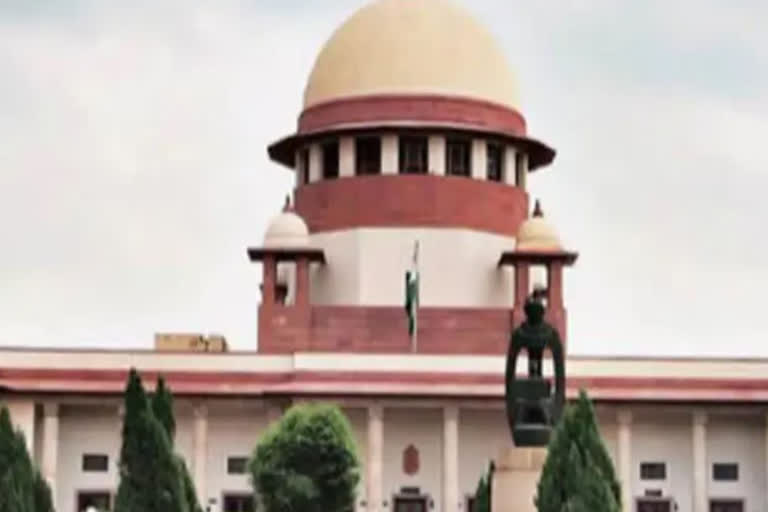New Delhi: The Supreme Court on Saturday pulled up the Central government for blaming the farmers for air pollution and not talking about other factors contributing to Delhi's air quality plunging to 'severe category'.
"Your projection is as if farmers are only responsible for the pollution...First let the Delhi people be controlled. Where is the effective mechanism to control fire crackers, vehicle pollution etc.?," questioned the court.
"Be the petitioners, the Delhi government or anybody else -- it has become a fashion to blame the farmers. Have you seen how crackers are being burnt in Delhi for the last seven days? What was the Delhi police doing?,"asked the court.
Read: Toxic Air, Froth in Yamuna; Delhi's deadly affair with pollution deepens
Centre told the court that none of the governments are even remotely blaming the farmers and are trying to work out on a solution to control pollution. Clarifying that he was not even remotely suggesting that only farmers are responsible for air pollution in the Delhi-NCR region, Solicitor General of India, Tushar Mehta said, "the language in which our response as lawyers is taken might send the wrong message which was not the intention."
To this, Chief Justice NV Ramana replied: "Unfortunately I am not a sophisticated speaker. This is my drawback as I learnt English in Class 8. I don't have good English for expressing words. I studied law in the English language."
The bench comprising the CJI, Justice DY Chandrachud and Justice Surya Kant were informed by SG Mehta that there are avenues for the farmers like conversion of stubble burning into fuel, machines for disposal of stubble into soil as fertiliser etc so that they don't have to burn the stubble.
When SG Mehta informed the court that there are 2 lakh machines available for stubble disposal at 80 per cent subsidised rate, Justice Kant asked, "You are saying two lakh machines are available, but the poor farmers cannot afford these machines. We can't expect those farmers to purchase those machines. Why can't the Centre and the state governments provide the machines. Take away the stubble for use in paper mills and various other purposes."
"Can the officials assisting you point out the actual price after subsidy. I am a farmer, I know it, Hon'ble CJI is a farmer he knows it," said Justice Kant.
Justice Chandrachud questioned how many machines are actually supplied, what is the subsidy given, what will be the total capital cost for machine required, who collects the stubble between the thermal power plant and farmers, what is the system etc.
SG Mehta responded saying that there are agencies deployed for collecting stubble which take it to the thermal power plant where it is converted for usage.
Terming it "a question of simple economy", the court said, "Currently, they have to prepare the field for next row and therefore they burn it. If the government can collect stubble free of cost and convert it into fuels and send it to thermal power plants the farmers will have nothing to worry about."
Read: Parts of northern India wake up to dense layer of smog amid rising air pollution concerns
"The problem is not with the implementation but with incentivisation. If there would be incentives available to the farmers they won't be burning," said Justice Chandrachud.
He said that there is a window when the farmers have to harvest their land for the next row and whatever mechanism is created that has to be available in that window period. "Mr Solicitor, this was late monsoon, window for the farmers was delayed...they want to benefit from the winters for the wheat crop. So was any step taken during those 15 days? You are still in the process of issuing tenders and all," Justice Chandrachud said.
Highlighting the "seriousness of the problem", Justice Chandrachud said that in Delhi, schools have opened and we are exposing lungs of little children to such pollution after COVID-19. The Court emphasised that some emergency measures need to be taken to prevent the pollution.
SG Mehta informed the court that a meeting is scheduled in the later part of the day to discuss on pollution. "Call for the meetings of other state governments also, we want something to happen. In 2-3 days we should be in a position to feel better," said CJI.
SG said that as per the meteorological department, north west winds and surge in stubble burning is the cause for the pollution currently and till November18th we will have to be very careful and ensure that we don't go beyond 'severe'.
Read: Delhi gasps for fresh air as AQI dips to 'severe category'
"Why don't you ask the state of Haryana and Punjab to hold stubble burning for 2-3 days?," asked CJI. SG responded saying that a meeting with the Chief secretaries of both the states was held and they both are cooperating.
SG said that surge is in Punjab and the state would need to buckle up. Delhi government told the court that the situation is like we are consuming 20 cigarettes a day even if we are not smoking.
Court adjourned the matter till November 15 and asked the centre to give its details regarding the steps it has taken to control the pollution.



